Our sustainability cluster brings together research groups contributing to understanding and responding to the challenges our planet is facing.
Visit the listings of our research groups or our featured projects:
Agriculture at Otago | Ahuwhenua ki Ōtākou, Rangahau
A University of Otago Research Theme
Advancing profitability and environmental sustainability of primary industry in New Zealand
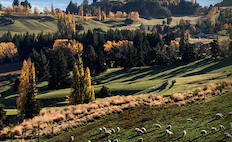 We have extensive research capabilities that can be applied to improve risk mitigation, economic, environmental, and social performance of the primary sector.
We have extensive research capabilities that can be applied to improve risk mitigation, economic, environmental, and social performance of the primary sector.
Our focus is:
- Enhancing agricultural productivity
- Adding value to primary industry products
- Sustainable and profitable environmental management
Email: ag@otago.ac.nz
Website: otago.ac.nz/agriculture
Carbon sequestration in New Zealand's southern fiords
Investigating and protecting the carbon storage potential of marine sediment
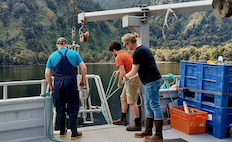 Our research is investigating the natural ability of Fiordland's marine sediments to collect and store carbon that is fixed from the atmosphere by the surrounding rainforest and marine ecosystem. We will assess the vulnerability of this significant carbon sink to human impacts including forest and water management and changing climate and ocean conditions.
Our research is investigating the natural ability of Fiordland's marine sediments to collect and store carbon that is fixed from the atmosphere by the surrounding rainforest and marine ecosystem. We will assess the vulnerability of this significant carbon sink to human impacts including forest and water management and changing climate and ocean conditions.
Our research findings will support the government to improve reporting of blue carbon (marine sequestration) in the New Zealand Greenhouse Gas Inventory. We will assess options to protect and possibly enhance the storage potential of this valuable natural asset.
Email: chris.moy@otago.ac.nz
Website: otago.ac.nz/research/centres/otago0241619.html
Catchments Otago
A University of Otago Research Theme
Effective freshwater management through equitable and appropriate land strategies
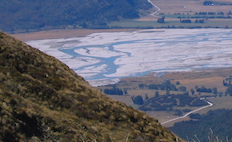 We employ multidisciplinary approaches to share natural resources that consider environmental, social and economic outcomes.
We employ multidisciplinary approaches to share natural resources that consider environmental, social and economic outcomes.
We endeavour to understand community needs, facilitate information sharing, and encourage direct collaboration between Governmental Authorities, industry partners and freshwater catchment communities to help guide improvement of land and water management strategies in Otago and Southland.
Email: contact@catchmentsotago.org
Website: catchmentsotago.org
Centre for Sustainability | Kā Rakahau o Te Ao Tūroa
A University of Otago Research Centre
Whenua ora, tangata ora: collaborative research for a sustainable future
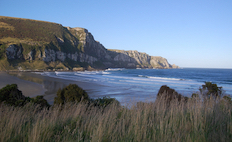 The Centre for Sustainability is an interdisciplinary research centre working on local and global sustainability challenges. Our research informs choices, adaptations and transformations in policy and practice to enhance social, cultural, environmental and economic well-being.
The Centre for Sustainability is an interdisciplinary research centre working on local and global sustainability challenges. Our research informs choices, adaptations and transformations in policy and practice to enhance social, cultural, environmental and economic well-being.
Our research expertise includes aspects of kaitiakitanga, climate change mitigation and adaptation, sustainable food and agriculture, resilient communities, natural hazards, energy, mobility and biodiversity.
Email: centre-sustainability@otago.ac.nz
Website: otago.ac.nz/centre-sustainability
Climate and Energy Finance Group (CEFGroup)
A University of Otago Research Theme
Research in climate finance, sustainable investing, energy markets and carbon markets
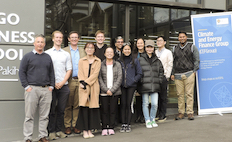 CEFGroup is one of the largest climate and sustainable finance teams in the world. We embrace interdisciplinarity and are focused on delivering policy and practitioner- relevant research. As one of only a few dedicated climate and sustainable finance research groupings in Australasia and Asia, we are strategically placed to influence efforts to finance the decarbonisation in these regions.
CEFGroup is one of the largest climate and sustainable finance teams in the world. We embrace interdisciplinarity and are focused on delivering policy and practitioner- relevant research. As one of only a few dedicated climate and sustainable finance research groupings in Australasia and Asia, we are strategically placed to influence efforts to finance the decarbonisation in these regions.
Email: cefgroup@otago.ac.nz
Website: blogs.otago.ac.nz/cefg/
Coastal People: Southern Skies
A Centre of Research Excellence (CoRE)
Responding to climate change
Coastal People: Southern Skies is a Centre of Research Excellence (CoRE) based at the University of Otago.
Our vision is flourishing wellness (mauri ora), of coastal social-ecological systems and communities.
The collaboration connects communities with world-leading, cross-discipline research to support transformative change to rebuild coastal ecosystems.
The focus is on the changes resulting from ocean warming and acidification, sea-level rise, and climate change. Research includes responding to the decline in culture, local economy, and well-being of coastal people in New Zealand and across the Pacific.
Email: cpss@otago.ac.nz
Website: otago.ac.nz/sciences/research/coastal-people.html
Food Waste Innovation | Auahatanga Parakai
A University of Otago Research Theme
Reducing the volume and impact of food waste
 Food Waste Innovation measures food waste, develops reduction strategies, applies innovative technology, and works to modify producer and consumer behaviour.
Food Waste Innovation measures food waste, develops reduction strategies, applies innovative technology, and works to modify producer and consumer behaviour.
Our goal is to harness the best scientific expertise to provide effective solutions to food waste problems. We work collaboratively with stakeholders and supporters in the public and private sector.
Email: food.waste@otago.ac.nz
Website: foodwaste-otago.org/
Future Ocean Research Theme | Te Au Heke
A University of Otago Research Theme
Understanding human impacts on our marine ecosystem and physical environment
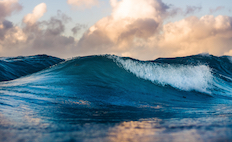 The Future Ocean Research Theme (formerly Ocean Acidification) supports multi-disciplinary and collaborative research focused primarily upon the Otago shelf region but that is also applicable to New Zealand and the wider South Pacific region.
The Future Ocean Research Theme (formerly Ocean Acidification) supports multi-disciplinary and collaborative research focused primarily upon the Otago shelf region but that is also applicable to New Zealand and the wider South Pacific region.
We use the development of biological and physical time series, controlled experiments, and modelling to establish the interactions between chemical, physical, and biological processes and the broader implications of change in the ocean around New Zealand.
Email: linn.hoffmann@otago.ac.nz
Website: otago.ac.nz/future-ocean
He Karapitipitinga Mariko | Immersive Regenerative Tourism
A MBIE Endeavour Fund Research Programme
He karapitipitinga mariko – Immersive regenerative tourism experiences in Aotearoa, uses virtual and mixed-reality technologies to:
- Enable tourism without travel
- Enhance local-based tourism
- Reduce carbon emissions from international travel
- Open up environmentally sensitive areas in a safe manner
- Allow tangata whenua to be in control of how their knowledge is shared
This 5-year research programme will create a technology-supported ‘new tourism’ model and radically transform the sector to address Aotearoa’s need for a more sustainable tourism industry.
Email: tobias.langlotz@otago.ac.nz
Website: He Karapitipitinga Mariko
He Kaupapa Hononga: Otago's Climate Change Research Network
A University of Otago Research Network
Fostering climate change research using interdisciplinary and co-created knowledge
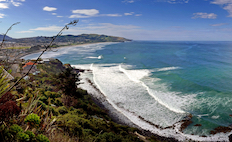 He Kaupapa Hononga is a network of researchers committed to climate action including assessment, mitigation, adaptation and restoration. We are also committed to supporting collaborations between mātauranga Māori / mātauranga Kāi Tahu and western scientific knowledge.
He Kaupapa Hononga is a network of researchers committed to climate action including assessment, mitigation, adaptation and restoration. We are also committed to supporting collaborations between mātauranga Māori / mātauranga Kāi Tahu and western scientific knowledge.
Our network also works collaboratively with established research groups, He Kaupapa Hononga also supports postgraduate students studying climate change and the Otago Climate Change Postgraduate Network (OCCPN).
Email: hekaupapa.hononga@otago.ac.nz
Website: otago.ac.nz/he-kaupapa-hononga
New Zealand Centre for Sustainable Cities | Te Pokapū Rōnaki Tāone-nui
A University of Otago Research Centre
Sustainable solutions to the economic, social, environmental and cultural development of our urban centres
 The New Zealand Centre for Sustainable Cities is an inter-disciplinary research centre dedicated to providing the research base for innovative solutions to the economic, social, environmental and cultural development of our urban centres.
The New Zealand Centre for Sustainable Cities is an inter-disciplinary research centre dedicated to providing the research base for innovative solutions to the economic, social, environmental and cultural development of our urban centres.
Email: philippa.howden-chapman@otago.ac.nz
Website: sustainablecities.org.nz
One Health Aotearoa
A University of Otago Research Centre
An integrative approach to understanding, preventing, and controlling infectious disease
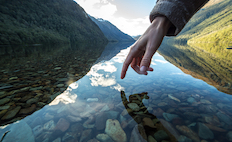 One Health Aotearoa is an alliance of New Zealand's leading infectious diseases researchers committed to working together to address important health hazards in New Zealand, and beyond.
One Health Aotearoa is an alliance of New Zealand's leading infectious diseases researchers committed to working together to address important health hazards in New Zealand, and beyond.
Many human infections are the result of interactions with animals and the environment. We have identified three key research themes to focus on: preventing emerging infectious diseases, ensuring healthy fresh water, and reducing antimicrobial resistance.
Mātauranga Māori is interwoven and underpins all of One Health Aotearoa's research. We recognise the close alignment between Te Ao Māori (the Māori world) and the One Health paradigm.
Email: one.health@otago.ac.nz
Web: onehealth.org.nz
Otago Energy Research Centre (OERC)
A University of Otago Research Theme
Interdisciplinary energy-related research that contributes to more resilient and low carbon energy systems
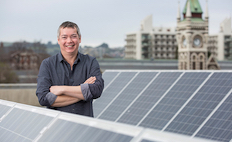 The OERC creates opportunities for high-impact and internationally recognised energy-related research via an interdisciplinary network of University of Otago researchers and their external collaborators.
The OERC creates opportunities for high-impact and internationally recognised energy-related research via an interdisciplinary network of University of Otago researchers and their external collaborators.
This includes:
- Incubation of new energy-related interdisciplinary research
- Driving research on energy transitions toward a more resilient and low carbon future
- The Creation of the 'UoO Energy Living Lab' to promote novel sustainable energy practices within the University of Otago
- Providing a channel for energy-related external engagement at international, national and regional levels.
Email: oercadmin@otago.ac.nz
Website: otago.ac.nz/oerc
Polar Environments
A University of Otago Research Theme
Fostering the expansion of polar research
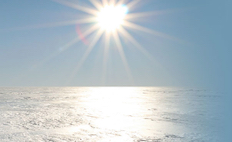 Our location has enabled a particularly strong connection with Antarctica and the Southern Ocean. Our researchers are actively involved in Antarctica New Zealand and the New Zealand Antarctic Research Institute.
Our location has enabled a particularly strong connection with Antarctica and the Southern Ocean. Our researchers are actively involved in Antarctica New Zealand and the New Zealand Antarctic Research Institute.
A key objective is to mentor emerging researchers with an interest in polar studies, and provide them with support to develop knowledge and networks nationally and internationally.
Our programme includes:
- Polar ice-ocean physics and modelling
- Glaciers, ice shelves and ice sheets
- Marine environments
- Cold adaptation in plants and animals
- Antarctic geology
- Polar atmosphere and ionosphere
- Marine chemistry
Email: craig.marshall@otago.ac.nz
Website: otago.ac.nz/polar-environments
Sustainability Research at Otago | Rangahau Toitūtanga ki Ōtākou
A University of Otago Research Strength
Knowledgebase and networks offering a powerhouse of research expertise
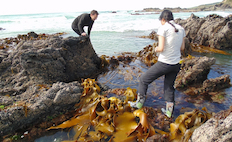 Sustainability Research at Otago is a guide to our specialised research collaborations working towards a sustainable future.
Sustainability Research at Otago is a guide to our specialised research collaborations working towards a sustainable future.
Our multidisciplinary knowledge base and extensive networks provide a powerhouse of research expertise to find solutions to the planet's most pressing challenges.
The United Nations' Sustainable Development Goals guide our research. Our expertise in applied practice focuses on delivering a better future for people and our environment.
Website: otago.ac.nz/research/sustainability
Sustainability featured projects | Rangahau toitūtanga
Kurī overlooked for ecological impact on early New Zealand
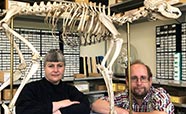 The arrival of humans, and the kiore (Pacific rat) they brought with them, has been well documented as bringing about major changes to Aotearoa New Zealand's environment, but what about their pets? University of Otago researchers believe kurī (Polynesian dogs) have been overlooked, and even erroneously exonerated by some scientists, for their ecological impact.
The arrival of humans, and the kiore (Pacific rat) they brought with them, has been well documented as bringing about major changes to Aotearoa New Zealand's environment, but what about their pets? University of Otago researchers believe kurī (Polynesian dogs) have been overlooked, and even erroneously exonerated by some scientists, for their ecological impact.
Ocean stressors: Sink or swim?
 Temperature rise caused by climate change is a major threat to the ecosystems of the world's oceans, but it's just one of a range of problems affecting our seas.
Temperature rise caused by climate change is a major threat to the ecosystems of the world's oceans, but it's just one of a range of problems affecting our seas.
“We can already see the impact of climate change locally,” says Associate Professor Linn Hoffmann. “We're seeing changes to the composition and resilience of various ecosystems, which are impacting the health of the oceans. There's overwhelming evidence that diversity is declining.”
Power restructure needed to enhance Indigenous engagement in planning
 Impact assessments have a patchy history of effectively engaging Indigenous communities and providing positive outcomes for their aspirations – University of Otago research is providing a starting point to improve the situation.
Impact assessments have a patchy history of effectively engaging Indigenous communities and providing positive outcomes for their aspirations – University of Otago research is providing a starting point to improve the situation.
Spreading the mats of welcome and belonging
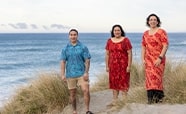 The Falafolaloa project will draw on the experiences of local Pacific communities to help welcome Pacific climate change refugees to Aotearoa New Zealand.
The Falafolaloa project will draw on the experiences of local Pacific communities to help welcome Pacific climate change refugees to Aotearoa New Zealand.
"As environmental conditions across the Pacific become increasingly difficult, further adaptation will be needed in the balance of these flows between homelands and diaspora” says Associate Professor Rosalina Richards.
Power probe: The price of inertia
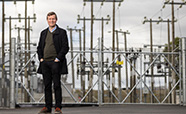 Dr Peter Gibbard's study into why people choose to switch electricity providers not only provides an interesting insight into consumer behaviour, but also has important real-world implications – a combination that speaks to the unique career of its lead researcher.
Dr Peter Gibbard's study into why people choose to switch electricity providers not only provides an interesting insight into consumer behaviour, but also has important real-world implications – a combination that speaks to the unique career of its lead researcher.
The sustainability crisis and the role of research
 As the sustainability crisis deepens, business-as-usual is no longer an option, says Professor Janet Stephenson. She argues that we have to radically change how we produce and consume – and that integrated research must play a key role in that.
As the sustainability crisis deepens, business-as-usual is no longer an option, says Professor Janet Stephenson. She argues that we have to radically change how we produce and consume – and that integrated research must play a key role in that.
Research in our four academic divisions | Te rangahau ki ō mātou whare mātauranga e whā
View more research activity in our academic divisions: